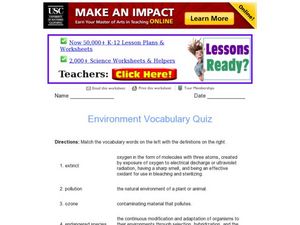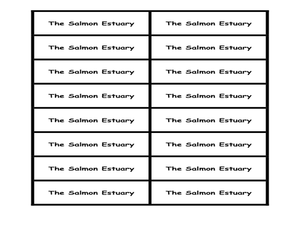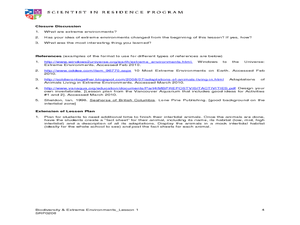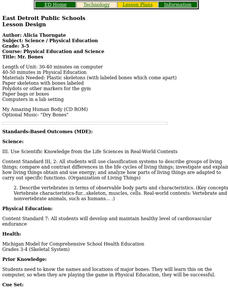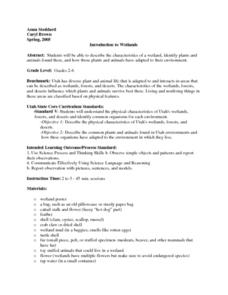Curated OER
Discussion of Adaptation
Students discuss ways in which dinosaurs adapted to their environments. They apply the same logic to an analysis of human habitat, survival needs, and survival need fulfillment to explain how people have adapted to their environment.
Curated OER
Environment Vocabulary Quiz
In this environment vocabulary worksheet, students draw lines to match 13 words to their definitions in another column. Words pertain to the environment. Examples: biosphere, habitat, greenhouse effect, smog.
Curated OER
Magnetism and Electricity Vocabulary Quiz
In this magnetism and electricity activity, learners match vocabulary words on the left with definitions on the right. Worksheet is labeled as a quiz, but may be used for review/practice.
Curated OER
Plants Vocabulary Quiz
In this plant vocabulary worksheet, students draw lines to match 10 plant words with their meanings. Prior knowledge is assumed.
Curated OER
The Salmon Estuary And Human Impacts
Students have discussions and complete activities about the pacific salmon life cycle and marine parasites. In this salmon lesson plan, students complete activities such as observing sea lice, playing a tag game, and a board game.
Michigan Sea Grant
Fish Habitat and Humans
Strict habitat requirements are needed for the survival of fish populations and fish variety in the Great Lakes. Young scientists become experts in the basic needs of fish and understand how survival necessities can vary with different...
Curated OER
Simple Machines IV - Wheels and Axles
Fourth graders study everyday examples of simple machines. They examine how the combination of a wheel and axle works more efficiently than either in isolation. In a demonstration lesson, they see how a spring scale shows a force pulling...
Curated OER
Extreme Environments
Students examine extreme environments and the characteristics that make them. In this adaptation instructional activity students see how animals have adapted to these environments.
Curated OER
Water Pollution
Students explore the causes of water pollution. In this environmental instructional activity, students conduct experiments with natural filtration systems.
Curated OER
Mr. Bones
Students play CD-ROM game My Amazing Human Body, and participate in relay game in Phys. Ed. where they put together skeleton on which body parts are labeled.
Curated OER
What Lives in the Open Ocean and Where Do They Live?
Students explore oceanography by participating in a flash card activity. In this ocean inhabitant lesson, students define a list of ocean related vocabulary terms and answer ocean geography study questions. Students utilize organism...
Curated OER
Growth Stages 1: Infancy and Early Childhood
Students explore biology by completing a human growth worksheet. In this child development instructional activity, students read assigned text about the human birth process and the ideal growth patterns for a child. Students answer study...
Curated OER
The Wetlands
Fourth graders learn what a wetland is, where they can be found, and what types of plants, animals and characteristic are associated with the wetlands. They also participate in an activity to explore and enhance their knowledge of...
Curated OER
Middle Childhood and Early Adolescence
Students become familiar with body changes during puberty. For this stages of human development lesson, students review the stages of development from 1-5. Students read an article called I'm Growing but Am I Normal? and discuss the...
Curated OER
A Sense of West Virginia
Students consider their perceptions of the world through their 5 senses while visiting the West Virginia State Museum. In this West Virginia history lesson, students discover how knowing about the past helps with their understanding of...
Curated OER
Introduction to Wetlands
Learners describe the characteristics of a wetland, identify plants and animals found there, and how those plants and animals have adapted to their environment. They visit stations, view a video, and complete a KWL about the wetlands.
Curated OER
Mystery Creek
Fourth graders are introduced to the Riparian Ecosystem. They define the following terms: riparian and riparian ecosystem. Students take a trip to the creek, where they make observations about the environment around them. They are...
Curated OER
Radioactive Beans
Pupils investigate radioactive atoms. In this radioactive beans lesson, students experiment with split peas and beans to determine what happens when a radioactive atom decays.
Curated OER
Extra! Extra!
Students describe how plants and animals depend on each other. They see how living and nonliving environments change over time. They identify ways in which humans have changed their environment and the effects of those changes.
Curated OER
Introducing Biodiversity
Students identify the basic components necessary for biodiversity, the critical and countless benefits of habitats, as well as the serious present and future threats to their ongoing existence.
Curated OER
Super Stream Keeper's
Students are introduced to Delaware's waterways as precious resources used for drinking water, water for agricultural and industrial uses, recreational areas, and as habitats for wildlife. They are introduced to wastewater discharges,...
Curated OER
Rocks, Minerals, and Erosion
Fourth graders describe the difference between minerals (composed of the same substance throughout) and rocks (composed of two or more minerals). They recognize that there are three classes of rocks: igneous, sedimentary, and metamorphic
Curated OER
Eating Up Energy
Students will compare and contrast amount of energy consumption and CO2 emissions among the top ten user countries to understand global effects of emissions. They also map the global impact of energy consumption and CO2 emissions.
Other popular searches
- 4th Grade Physical Science
- Physical Science Matter
- Elementary Physical Science
- Physical Science Projects
- Physical Science "Motion
- Physical Science Activities
- Physical Science Lessons
- Physical Science "Motion"
- 5e Physical Science Lessons
- Physical Science Space
- Physical Science Technology
- Physical Science Content



